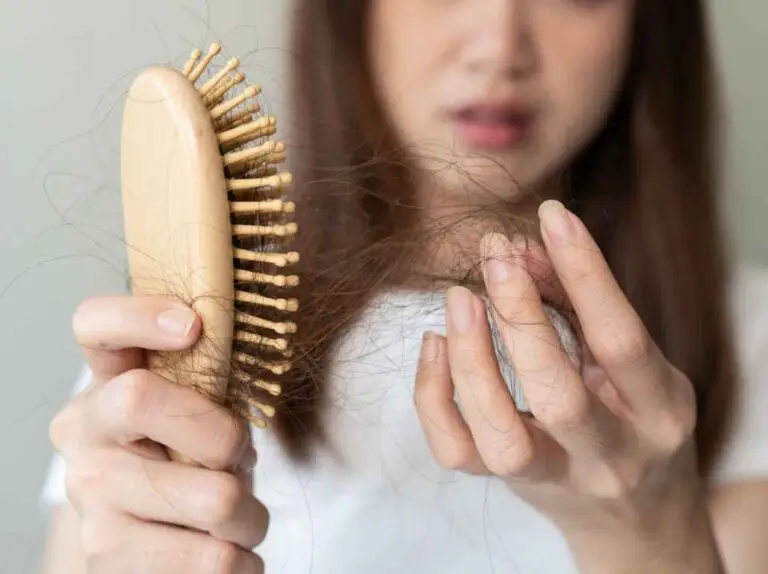Hair Loss and Stress: Heal from the Inside Out
Have you wondered whether your hair loss and stress are connected? Are you worried about how much hair you are losing and don’t know what to do? Some hair does come out with brushing and shampooing, but have you noticed more hair shedding in your brush or shower drain during stressful times? It’s a fact that stress affects more than just your emotions — it can also take a toll on your body, including your hair. For many, this means experiencing temporary hair thinning or shedding.
In this article, we’ll uncover how stress impacts your hair follicles, explore the emotional challenges of hair loss, and share practical tips to support your hair’s health and overall well-being.
How Stress Causes Hair Loss
Stress is more than just an emotional state. It’s a physiological response that can influence multiple systems in the body, including the hair growth cycle.1 If you’re noticing sudden or excessive shedding, visiting your doctor can help rule out other potential causes and guide you to effective solutions. They may recommend hair loss treatments such as topical solutions, medications, or lifestyle changes to support hair health.
3 Medical Reasons For Hair Loss
Telogen Effluvium
Telogen effluvium is one of the most common forms of stress-induced hair loss. Under normal circumstances, hair follicles cycle through growth (anagen), transition (catagen), and rest (telogen) phases. However, during periods of intense stress, many hair follicles prematurely enter the telogen phase, leading to excessive shedding. This type of hair loss typically appears a few months after the stressful event, making it difficult to pinpoint the exact trigger.1
Alopecia Areata
Alopecia areata is an autoimmune condition where the body’s immune system attacks hair follicles, causing patchy hair loss. While the exact cause remains unclear, stress is often considered to exacerbate this condition.1
Trichotillomania
For some individuals, stress manifests as trichotillomania, a compulsive urge to pull out the hair on the scalp, eyebrows, eyelashes, beard, or mustache. This behavior can result in noticeable hair thinning or bald patches over time.2
Hair Loss And Stress: The Emotional Impact
Hair plays a significant role in self-expression, identity, and cultural norms. Losing it can feel deeply personal and emotional, triggering a range of psychological responses:
- Low self-esteem: Many individuals struggle with feelings of inadequacy or diminished confidence as their hair thins or falls out.
- Anxiety and depression: The visibility of hair loss can lead to social anxiety, making people feel self-conscious in public or during everyday interactions. Over time, this can contribute to isolation and depression. The constant worry about losing more hair can perpetuate stress, creating a vicious cycle.
- Identity challenges: Whether it’s a specific hairstyle or cultural significance, losing hair can feel like losing a part of one’s identity. This can be especially challenging for individuals who have always been known for their hair.
Acknowledging the emotional toll of hair loss is an essential step in healing. It’s important to remember that emotional well-being is just as important as addressing the physical symptoms.
Break The Cycle Of Hair Loss And Stress
The connection between stress and hair loss can feel like a never-ending loop: stress causes hair loss, and hair loss causes more stress. Breaking this cycle requires a holistic approach that addresses both the physical and emotional aspects of the condition.
1. Tips To Manage Stress Effectively
It’s important to adopt strategies that reduce stress-related hair loss:
- Mindfulness and meditation: Deep breathing, yoga, or guided meditation can calm the mind and lower stress levels.
- Physical activity: Regular exercise is a stress reliever that also promotes overall health.
- Adequate sleep: Poor sleep can exacerbate stress, so aim for seven to nine hours of quality sleep each night.
- Therapy or counseling: Speaking with a mental health professional can help you manage stressors and develop healthier coping mechanisms.
2. Tips To Support Hair Health
Addressing stress is just one part of the equation. Supporting your hair’s physical health is equally important:
- Balanced diet: Nutrients like biotin, zinc, iron, and omega-3 fatty acids are essential for healthy hair growth. Incorporate foods like eggs, nuts, leafy greens, and fatty fish into your diet.3
- Topical treatments: Products containing minoxidil or essential oils like rosemary can safely and effectively stimulate hair growth and improve scalp health.
- Hair care practices: Be gentle with your hair — avoid excessive heat, tight hairstyles, or harsh chemical treatments.
3. Get Emotional Support For Hair Loss And Stress
Coping with the emotional impact of hair loss can be just as challenging as addressing the physical symptoms. Here are ways to find support:
- Join support groups: Sharing your experiences with others who understand can provide comfort and a sense of community.
- Self-compassion: Practice kindness toward yourself. Remember that hair loss doesn’t define your worth or beauty.
- Exploring options: If hair loss significantly impacts your confidence, consider options like wigs, hairpieces, or cosmetic procedures to restore your appearance.
4. Seek Professional Help For Hair Loss And Stress
Consulting a dermatologist or trichologist can help identify the underlying causes of hair loss and provide personalized treatment options. Consider working with a mental health professional to develop effective coping strategies for stress management.
Hair Loss And Stress: Conclusion
Recovering from stress-induced hair loss takes time, patience, and a commitment to holistic self-care. By addressing both the physical and emotional factors contributing to hair loss, you can begin to heal from the inside out.
Remember, you don’t have to face this journey alone. Whether it’s reducing stress, exploring treatment options, or seeking emotional support, help is available every step of the way
More Health Articles To Read
Women’s Self-Help: Physical Health For Mental Health
Medication-Assisted Treatment For Long Term Recovery
Best Self Care Tips For Brain Health In 2025





















